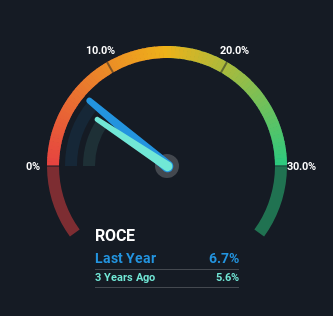
If we want to find a stock that could multiply over the long term, what are the underlying trends we should look for? Typically, we'll want to notice a trend of growing return on capital employed (ROCE) and alongside that, an expanding base of capital employed. This shows us that it's a compounding machine, able to continually reinvest its earnings back into the business and generate higher returns. So on that note, Dentsu Group (TSE:4324) looks quite promising in regards to its trends of return on capital.
Return On Capital Employed (ROCE): What Is It?
Just to clarify if you're unsure, ROCE is a metric for evaluating how much pre-tax income (in percentage terms) a company earns on the capital invested in its business. To calculate this metric for Dentsu Group, this is the formula:
Return on Capital Employed = Earnings Before Interest and Tax (EBIT) ÷ (Total Assets - Current Liabilities)
0.067 = JP¥121b ÷ (JP¥3.6t - JP¥1.8t) (Based on the trailing twelve months to March 2024).
Therefore, Dentsu Group has an ROCE of 6.7%. In absolute terms, that's a low return and it also under-performs the Media industry average of 11%.
View our latest analysis for Dentsu Group

In the above chart we have measured Dentsu Group's prior ROCE against its prior performance, but the future is arguably more important. If you're interested, you can view the analysts predictions in our free analyst report for Dentsu Group .
What Can We Tell From Dentsu Group's ROCE Trend?
Dentsu Group is showing promise given that its ROCE is trending up and to the right. The figures show that over the last five years, ROCE has grown 38% whilst employing roughly the same amount of capital. Basically the business is generating higher returns from the same amount of capital and that is proof that there are improvements in the company's efficiencies. On that front, things are looking good so it's worth exploring what management has said about growth plans going forward.
Another thing to note, Dentsu Group has a high ratio of current liabilities to total assets of 50%. This can bring about some risks because the company is basically operating with a rather large reliance on its suppliers or other sorts of short-term creditors. While it's not necessarily a bad thing, it can be beneficial if this ratio is lower.
The Bottom Line
As discussed above, Dentsu Group appears to be getting more proficient at generating returns since capital employed has remained flat but earnings (before interest and tax) are up. Investors may not be impressed by the favorable underlying trends yet because over the last five years the stock has only returned 32% to shareholders. So with that in mind, we think the stock deserves further research.
If you'd like to know about the risks facing Dentsu Group, we've discovered 1 warning sign that you should be aware of.
While Dentsu Group isn't earning the highest return, check out this free list of companies that are earning high returns on equity with solid balance sheets.
New: Manage All Your Stock Portfolios in One Place
We've created the ultimate portfolio companion for stock investors, and it's free.
• Connect an unlimited number of Portfolios and see your total in one currency
• Be alerted to new Warning Signs or Risks via email or mobile
• Track the Fair Value of your stocks
Have feedback on this article? Concerned about the content? Get in touch with us directly. Alternatively, email editorial-team (at) simplywallst.com.
This article by Simply Wall St is general in nature. We provide commentary based on historical data and analyst forecasts only using an unbiased methodology and our articles are not intended to be financial advice. It does not constitute a recommendation to buy or sell any stock, and does not take account of your objectives, or your financial situation. We aim to bring you long-term focused analysis driven by fundamental data. Note that our analysis may not factor in the latest price-sensitive company announcements or qualitative material. Simply Wall St has no position in any stocks mentioned.
About TSE:4324
Dentsu Group
Operates in the advertising business in Japan, the Americas, Europe, the Middle East and Africa, and the Asia Pacific.
Undervalued with adequate balance sheet and pays a dividend.
Similar Companies
Market Insights
Community Narratives




